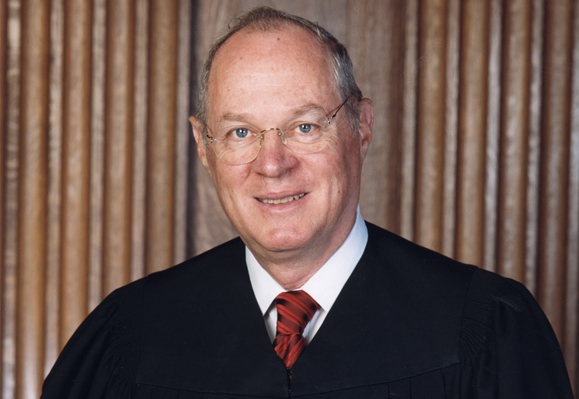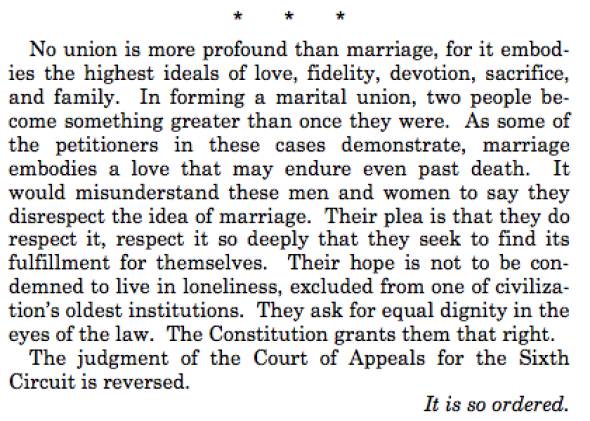In a five to four ruling, the U.S. Supreme Court effectively voted to overturn states’ bans on same-sex marriage June 26th – the same day as United States v. Windsor (which overturned the Defense of Marriage Act in 2013) and Lawrence v. Texas (which overturned a Texas law – and by extension all state laws – forbidding consensual sex between two persons of the same sex in 2003). And, as with both those rulings, the majority opinion was penned by an Irish Catholic Justice raised in post-WWII Sacramento, California.
And the last paragraph may be one of the most moving things ever written from a public office in support of same-sex marriage.
Justice Anthony Kennedy writes:
The decision argues that two provisions provided by the Fourteenth Amendment invalidate states’ bans on a marriage between same-sex partners – due process and equal protection of the law. According to Mark Joseph Stern at Slate, “The ‘liberty’ protected by the due process clause, Kennedy explains, protects gay couple’s fundamental right to marriage. And the equal protection clause bars the government from singling out a specific group – here, gays – and depriving them of certain rights.” That’s a nicely-woven argument from one of the Court’s most vocal gay rights judges.
celebratory gowns for all! pic.twitter.com/7zZWMDihv8
— Anne Helen Petersen (@annehelen) June 26, 2015
As others have argued, Anthony Kennedy’s opinion in this case, Obergefell v. Hodges, follows a sense of history and individual liberty that Kennedy has been working towards since his first pro-gay opinion on May 20, 1996 in Romer v. Evans, which declared that a Colorado law denying official protections to victims of discrimination based on their sexual orientation.
In Lawrence v. Texas, he wrote similarly emotionally of the right of freedom to choose sexual partners.
“It suffices for us to acknowledge that adults may choose to enter upon this relationship in the confines of their homes and their own private lives and still retain their dignity as free persons,” he wrote. “When sexuality finds overt expression in intimate conduct with another person, the conduct can be but one element in a personal bond that is more enduring.”
And in 2013’s U.S. v. Windsor, he touched on the changing attitudes towards gay couples: “It seems fair to conclude that, until recent years, many citizens had not even considered the possibility that two persons of the same sex might aspire to occupy the same status and dignity as that of a man and woman in lawful marriage.”
Much has changed since he was a child, being raised by Anthony J. Kennedy, who worked as a attorney closely with the California legislature, and Gladys McLeod, who was constantly involved in numerous local civic activities.
Kennedy has always had a predilection for privileging individual freedoms and the individual over group stereotypes. According to one Associated Press report, California Governor Pete Wilson spoke fondly of Kennedy’s willingness to evaluate people “based on their merits.”
And that’s exactly what he did here. ♦



Leave a Reply